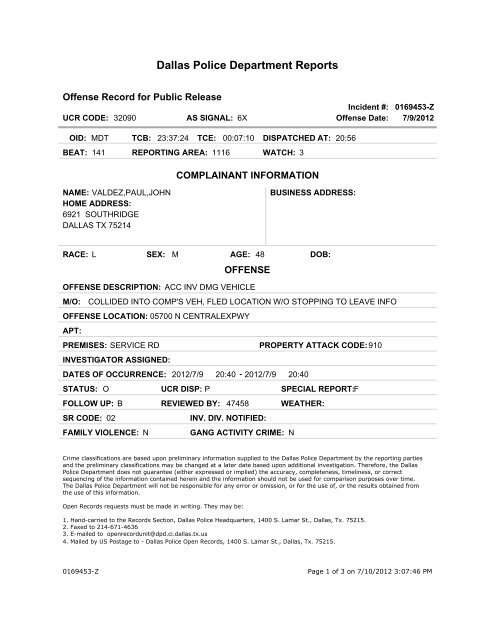Accessing police records in Dallas can often be a daunting process, but understanding the payment methods related to the Dallas Police Open Records Unit (DPORT) can make it much simpler. Whether you’re looking for incident reports, arrest records, or other public documents, knowing how to navigate the open records landscape is essential. This guide aims to provide a detailed analysis of payment options, processes, and tips for effectively obtaining police records in Dallas.
What is the Dallas Police Open Records Unit?
The Dallas Police Open Records Unit is responsible for managing requests for public records in accordance with the Texas Public Information Act. This unit ensures transparency within the police department by providing access to various documents upon request. The types of records that can be obtained include arrest reports, incident reports, and other records maintained by the department.
Understanding the Payment Process
When requesting records from the Dallas Police Department, it’s essential to understand the payment process, as fees may apply. Here’s a breakdown of the key points involving payments for accessing open records:
1. Payment Methods
The Dallas Police Open Records Unit accepts several payment methods for obtaining records. Here are the most commonly accepted options:
- Credit and Debit Cards: Most online requests can be paid through major credit and debit cards.
- Checks or Money Orders: For in-person requests, you can pay with a personal check or a money order made out to the Dallas Police Department.
- Cash: Some service centers may allow cash payments for immediate access to records.
2. Fee Structure
Understanding the fee structure associated with obtaining police records is crucial. Here’s a basic outline of the charges you may encounter:

| Type of Record | Cost |
|---|---|
| Arrest Reports | $10 per copy |
| Incident Reports | $10 per copy |
| Photographs (per image) | $5 |
| Audio/Video Recordings | $25 per request |
3. Fee Waivers
In certain circumstances, fees might be waived. For instance, if the release of information is in the public interest or if the requestor is a victim of a crime, they may qualify for a fee waiver. It’s essential to inquire about this option when submitting a request.

How to Submit a Request to the Dallas Police Open Records Unit
The process for submitting a request is straightforward but requires attention to detail. Here’s how you can do it:
1. Determine the Type of Record You Need
Before you begin your request, be clear about which records you need. This helps in processing your request more efficiently.

2. Complete the Open Records Request Form
You can download the Open Records Request Form from the Dallas Police Department’s official website. Make sure to fill it out accurately with all required details.
3. Submit Your Request
You can submit your request via:
- Email: Send your completed form to the designated email address provided on the website.
- Mail: Mail your completed form to the Open Records Unit at the Dallas Police Department’s address.
- In Person: Visit the Open Records Unit to submit your request directly.

Pros and Cons of Different Payment Methods
Understanding the advantages and disadvantages of each payment method can help you choose the best option for your needs.
1. Credit and Debit Cards
Pros
- Convenient for online requests.
- Immediate confirmation of payment.
Cons
- Processing fees may apply.

2. Checks or Money Orders
Pros
- No transaction fees.
- Good for those who prefer not to use online payments.
Cons
- Possible delays in processing while the check clears.
3. Cash Payments
Pros
- Immediate payment processing.
Cons
- Not advisable for large amounts due to safety concerns.
- Limited to in-person requests only.

Local Insights: Cultural Experiences Related to Open Records in Dallas
Dallas is known for its rich history and vibrant culture, and the public’s right to access police records is a testament to the city’s commitment to transparency and accountability. Engaging with local community events that focus on civil rights and public safety can provide deeper insights into how Dallas residents value open records. Cultural festivals often feature discussions about public policy, law enforcement practices, and community safety, offering opportunities for citizens to voice their opinions and learn about their rights regarding open records.
Frequently Asked Questions (FAQs)

What types of records can I request from the Dallas Police Open Records Unit?
You can request various records, including incident reports, arrest records, and certain types of audio or video recordings related to police activity.
How long does it take to process an open records request?
The processing time can vary; however, most requests are fulfilled within ten business days. Complex requests may take longer.

Can I appeal if my request is denied?
Yes, if your request for records is denied, you have the right to appeal the decision. You can contact the Texas Attorney General’s office for assistance with the appeal process.
Is there a way to expedite my request?
While there is no formal expedited process, clearly stating the urgency in your request may help. However, it ultimately depends on the nature of the request.
Conclusion
Accessing records from the Dallas Police Open Records Unit is a straightforward process when you understand the payment methods, fees, and how to submit a request. By taking advantage of the resources available, you can ensure that you obtain the necessary records efficiently and effectively. Remember, knowledge is key when it comes to leveraging your rights under the Texas Public Information Act.